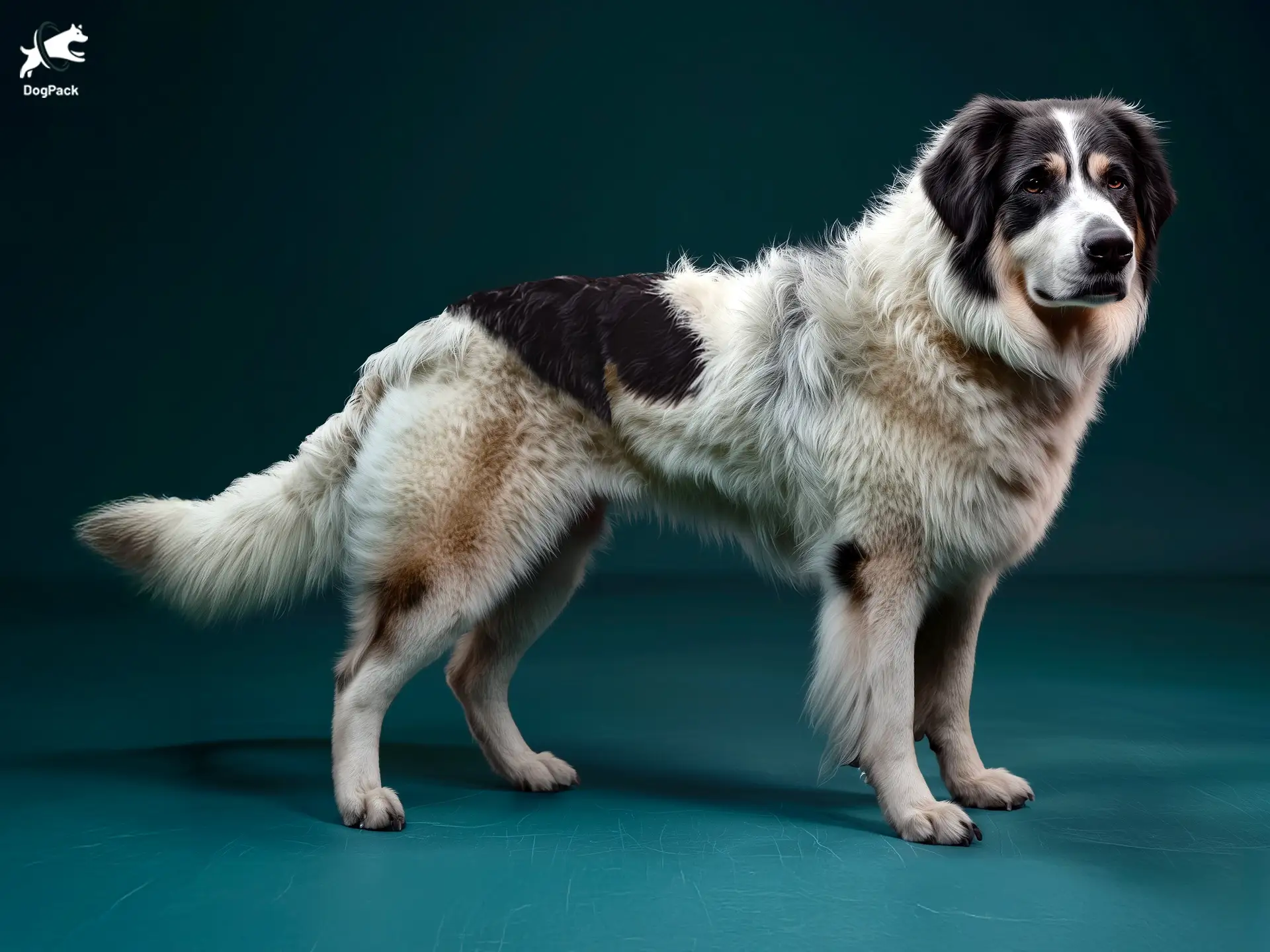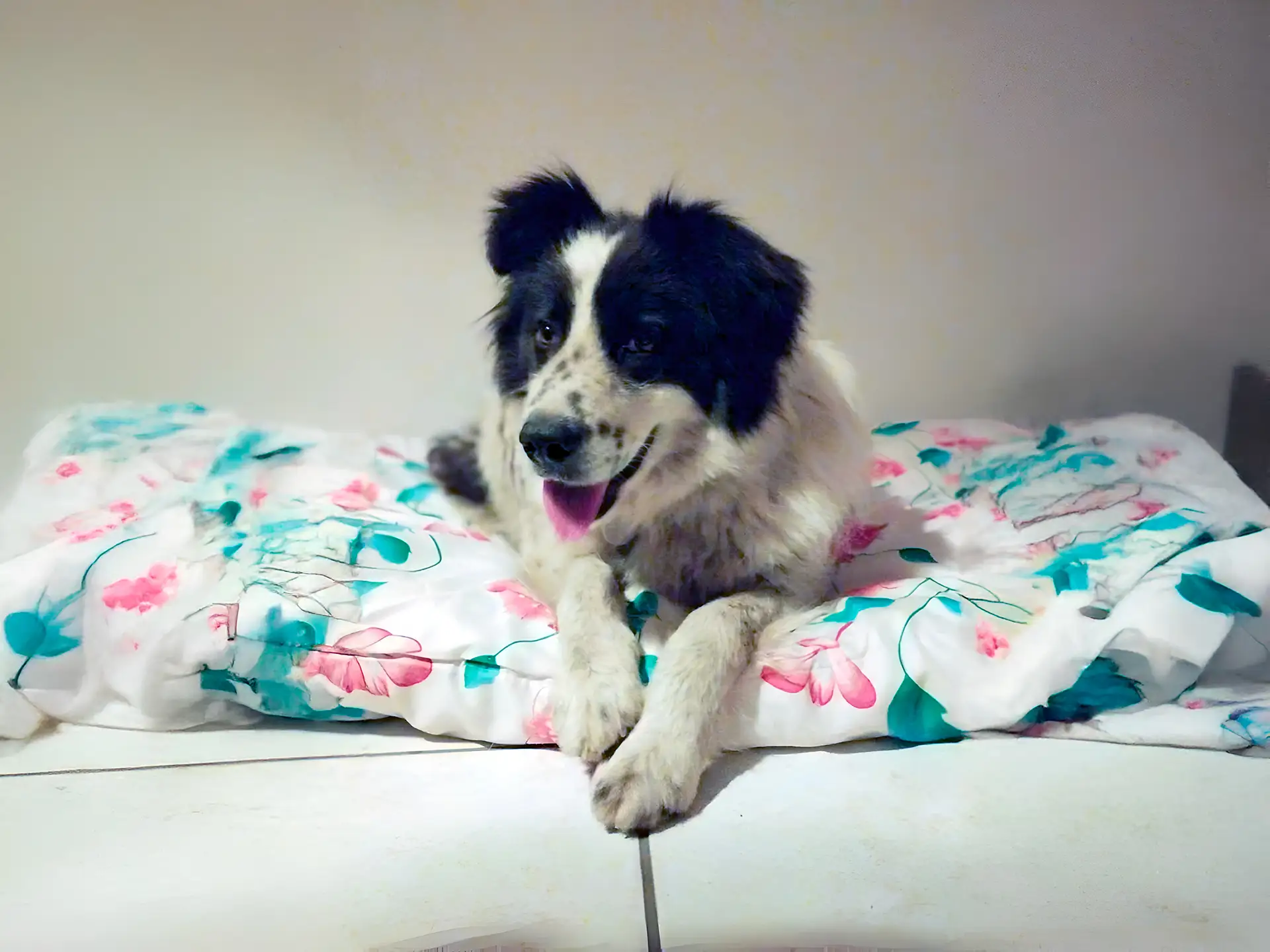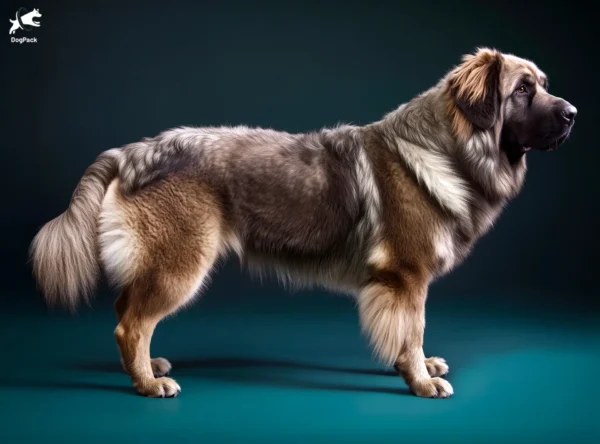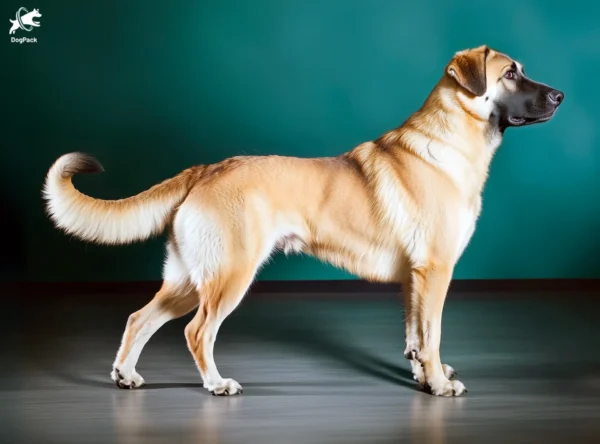Bucovina Shepherd Dog Breed Info & Overview
The Bucovina Shepherd, a majestic breed from Romania, is celebrated for its loyalty and protective instincts. Originally bred to guard livestock against predators like wolves and bears, this courageous dog is also known for its affectionate nature with family. With a powerful presence and a gentle heart, the Bucovina Shepherd stands out as a unique and captivating companion, blending bravery with devotion.
Characteristics
Pictures
Breed History
The Bucovina Shepherd hails from the rugged Carpathian Mountains of Romania. Bred by local shepherds, this breed was developed to protect flocks from predators like wolves and bears. Their fearless nature and imposing size made them indispensable guardians.
Originating specifically in the Bucovina region, these dogs have been a part of Romanian culture for centuries. They were not just protectors but also symbols of strength and loyalty within rural communities. Their name reflects their deep roots in this mountainous area.
In the 20th century, efforts were made to standardize the breed. Although still relatively rare outside their homeland, the Bucovina Shepherd has started gaining recognition internationally. Breed enthusiasts work diligently to preserve their unique traits and heritage.
Temperament, Personality
The Bucovina Shepherd is known for its unwavering loyalty to family. They’re naturally protective, making them excellent guardians for homes and livestock. While they may be reserved around strangers, they form strong bonds with those they consider part of their pack.
These dogs are intelligent and confident, often exhibiting independent thinking. Early socialization is crucial to ensure they interact well with other pets and people. With proper guidance, they can be gentle giants, especially affectionate with family members.
Despite their formidable appearance, they have a calm demeanor at home. The Bucovina Shepherd thrives on companionship and prefers not to be left alone for long periods. Their dedication makes them wonderful, albeit demanding, companions.
Physical Characteristics
The Bucovina Shepherd is a large and powerful dog. Males can reach up to 31 inches (79 cm) in height, exuding an imposing presence. Their muscular build is balanced, giving them both strength and agility necessary for their guardian role.
They possess a thick double coat, which provides protection against harsh weather conditions. The coat is typically white with patches of gray, black, or brindle, adding to their striking appearance. Their dense fur requires regular maintenance to keep it healthy.
Distinctive features include a broad head, strong jaws, and expressive dark eyes. Their ears are medium-sized and pendant, while their tail is bushy and carried low. Overall, the Bucovina Shepherd’s appearance commands respect and admiration.
Health Issues
The Bucovina Shepherd is generally a healthy breed but can be prone to certain genetic conditions. Hip dysplasia is a common concern due to their size, which can lead to mobility issues later in life. Regular veterinary check-ups are essential for early detection.
They may also be susceptible to bloat, a serious digestive condition. Feeding them smaller, frequent meals and avoiding vigorous exercise after eating can help mitigate this risk. Awareness of symptoms is crucial for prompt treatment.
Maintaining a healthy weight is vital to reduce stress on their joints. Owners should work closely with veterinarians to establish a suitable health plan. With proper care, the Bucovina Shepherd can enjoy a long and active life.
Grooming Needs
Given their thick double coat, the Bucovina Shepherd requires regular grooming. Brushing them at least twice a week helps prevent matting and reduces shedding. During seasonal coat changes, daily brushing might be necessary to manage the increased hair loss.
Bathing should be done as needed, typically every few months, unless they get particularly dirty. Using a dog-specific shampoo helps maintain their skin and coat health. Their dense fur may take longer to dry, so ensure they are thoroughly dried to prevent skin issues.
Don’t forget routine care like nail trimming, ear cleaning, and dental hygiene. Regularly checking their ears for signs of infection and brushing their teeth can prevent common health problems. Overall, grooming is a moderate commitment but essential for their well-being.
Exercise Requirements
The Bucovina Shepherd has moderate energy levels but still needs ample exercise to stay healthy and happy. Aim for at least 1–2 hours of activity daily, which can include walks, playtime, and mental stimulation. They enjoy having a job to do, reflecting their working heritage.
Access to a large, securely fenced yard provides them space to roam and patrol. They thrive in rural settings where they can stretch their legs. Interactive games and training sessions also help keep their minds sharp and engaged.
While they can adapt to family life, they’re not suited for apartment living. Without sufficient exercise, they may become bored or develop undesirable behaviors. Consistent physical activity is key to a well-adjusted Bucovina Shepherd.
Training Tips
Training a Bucovina Shepherd requires patience and consistency. Their intelligence and independent nature mean they can be strong-willed. Establishing yourself as a confident and fair leader is crucial to gain their respect and cooperation.
Early socialization is essential to expose them to various people, animals, and environments. This helps curb any overly protective tendencies and ensures they grow into well-rounded adults. Positive reinforcement methods work best, as they respond poorly to harsh training.
Incorporate obedience training into daily routines to reinforce good behavior. Mental stimulation through puzzle toys or advanced training can keep them engaged. Remember, the goal is to build a trusting relationship with your Bucovina Shepherd.
Nutrition, Diet
Feeding a Bucovina Shepherd requires attention to their size and activity level. High-quality dog food formulated for large breeds is recommended. They typically consume 4–6 cups of dry food daily, divided into two meals to prevent overeating and reduce the risk of bloat.
Ensure their diet is rich in protein to support muscle maintenance, with balanced fats and carbohydrates for energy. Consulting with a veterinarian can help tailor a diet plan specific to your dog’s needs, including any potential food sensitivities.
Avoid free-feeding and monitor their weight regularly. Providing fresh water at all times is essential, especially during hot weather or after exercise. Supplements like glucosamine may benefit joint health, but always seek professional advice before adding them to their diet.
Adoption, Breeders
If you’re considering adding a Bucovina Shepherd to your family, start by researching reputable breeders who prioritize health and temperament. Visit the Romanian Bucovina Shepherd Group for breeder referrals and breed-specific information.
Adoption is another option, though this breed is rare outside its native country. Check with breed-specific rescue organizations or shelters that occasionally have Bucovina Shepherds in need of homes. Websites like Petfinder can assist in your search.
Ensure any breeder provides health clearances for the parents and allows you to meet the puppy’s mother. A responsible breeder will also ask you questions to ensure their puppies go to suitable homes. Patience in your search will lead to a rewarding companionship.
Family Pet?
The Bucovina Shepherd can make a wonderful family pet for the right household. Their loyalty and protective instincts extend to all family members, including children. However, due to their size, supervision around small kids is advisable to prevent accidental knocks.
They can coexist with other pets if properly socialized from a young age. Their guarding instincts may lead them to be territorial, so introductions should be managed carefully. Early and ongoing socialization helps foster harmonious relationships.
This breed thrives in a family that understands their needs and can provide firm but loving guidance. They form deep bonds and are happiest when included in daily activities. The Bucovina Shepherd is a devoted companion for families prepared for the commitment.
Right For You?
Deciding if a Bucovina Shepherd is right for you depends on your lifestyle and experience. They are best suited for owners who have ample space and time to dedicate to their care. Experience with large, strong-willed breeds is beneficial.
If you value a protective and loyal companion and can meet their exercise and grooming needs, they may be an excellent match. They are not ideal for urban living or for those seeking a low-maintenance pet. Consider all aspects carefully before making a decision.
Providing a Bucovina Shepherd with a loving home can be incredibly rewarding. Their devotion and unique presence make them standout companions. Ensure you’re ready for the responsibility, and you’ll have a steadfast friend for years to come.
Conclusion
The Bucovina Shepherd is a remarkable breed that combines loyalty, courage, and a gentle heart. Ideal for those with space and experience, they offer unwavering protection and companionship. If you’re seeking a devoted guardian and have the resources to care for them, the Bucovina Shepherd could be the perfect addition to your family.
FAQs
-
Why were Bucovina Shepherds originally bred as livestock guardians?
Bucovina Shepherds were developed to protect flocks in the Carpathian Mountains. Their large size, courage, and natural guarding instincts made them ideal for defending against predators like wolves and bears.
-
How do Bucovina Shepherds handle hot weather?
Bucovina Shepherds have thick double coats, making them more comfortable in cooler climates. During warmer months, they need shaded areas and plenty of water to stay cool, as they can overheat quickly.
-
Are Bucovina Shepherds prone to barking?
Yes, Bucovina Shepherds are vocal, especially when guarding their territory. Their alertness and protective nature lead them to bark to warn off intruders, so they may not be ideal for quiet neighborhoods.
-
Do Bucovina Shepherds get along with children?
Bucovina Shepherds are known for their protective instincts and can be gentle with children in their family. However, their size and guarding nature mean supervision is essential around young kids and new faces.
-
How much grooming does a Bucovina Shepherd require?
Bucovina Shepherds need regular grooming due to their dense coat. Weekly brushing helps manage shedding, and during seasonal changes, more frequent grooming is necessary to remove loose undercoat fur.
Breed Ratings
The Bucovina Shepherd is smart and capable of learning quickly, especially with consistent training.
They enjoy playtime but are generally more serious due to their guardian instincts.
Moderate energy levels mean they appreciate daily exercise but also enjoy relaxing with family.
High shedding requires regular grooming to manage their dense coat.
They may chase smaller animals; early socialization can help mitigate this tendency.
Their thick coat demands regular brushing and maintenance.
They can be trained effectively with patience and positive reinforcement.
They prefer company and may develop separation anxiety if left alone too long.
Vocal by nature, they’ll alert you to anything unusual in their environment.
Generally low droolers, but this can vary between individuals.
Can be friendly with other dogs if properly socialized from a young age.
Generally healthy but watch for breed-specific health issues like hip dysplasia.














